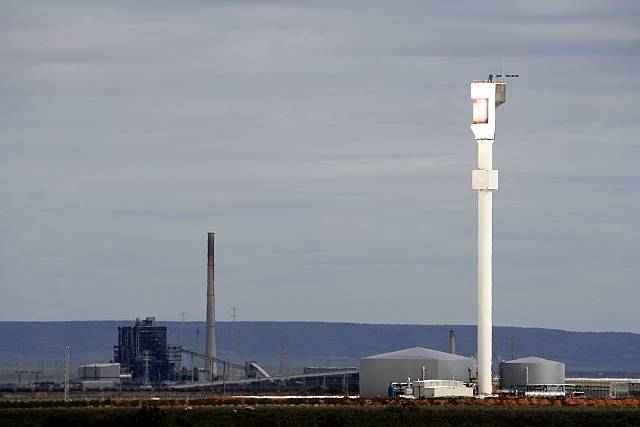|
|
Contact: David K. Clarke – ©
Introduction
In a democratic country with freedom of speech one has not only a right, but an obligation to express one's concerns; hence this and several other of my pages.Any government tends to run a country to its own maximum advantage; they govern for the governors, not for the people. "Power corrupts" and unfortunately those who climb to the top of the heap must be pretty single-mindedly fixated on the getting of power. We have constitutions and elections to try to curb the excesses, but on their own they are not enough.
| |||
|
In this last group can be included the Australian Abbott and Morrison governments. Their support of the mining and coal industries and denial of the need for action on climate change, ocean acidification and the millions of people who die each year from the air pollution resulting from the burning of fossil fuels, especially coal is payment for favours received. I have argued elsewhere that for a person in a position of power, such as PMs Abbott and Morrison, to knowingly lie in order to slow action on climate change is to take part in the greatest crime in the history of humanity.
Many people are content to say that all politicians are liars, self-serving and short sighted, that the country or the world is a mess, but then make absolutely no effort to improve the situation. In a democracy this is not good enough.
- "The only thing necessary for the triumph of evil is for good men to do nothing."
- Edmund Burke
- "The greatest threat to our planet is the belief that someone else will save it."
- Robert Swan
In an ideal democracy the government serves the best interests of the people of the nation. In a real democracy the government often serves the best interests of its own members, the interests of the party that controls government, the interests of those who donated most to the campaign funds or those who employ the most convincing lobbyists, or, in some cases, the interests of a single forceful leader.
The government can be the greatest enemy of the people of a nation; consider China under Moa Tsi Tung, North Korea under the Kim dynesty, Cambodia under Pol Pot, Uganda under Edi Amin, Russia under Stalin, Germany under Hitler, Zimbabwe under Magabi, Burma under The Generals, Chile under Pinochet, Argentina under Videla and Galtieri, and Japan under The Militarists. To a lesser extent you could include the Bush-Blair-Howard gang in the list, they involved their nations in the Iraq War; what worse can a leader do than involve his country in a war that is unethical, unjustified, and counterproductive?
In democracies, the political party in power has the responsibility of curbing the excesses of the national leader, Parliament has the responsibility of curbing the excesses of the party in power, and the people have the responsibility of curbing the excesses of government if all else fails. All are capable of failing in their duty (as happened in Australia at the time of the Iraq war).
|
|
Democracy
If a democracy is to work properly then more than free and fair elections is needed. There are at least three other major ingredients:
|
- Before the elections the voters must be honestly and fully informed of the intentions of those who stand for office;
- After the elections the politicians must endeavour to carry out their stated aims;
- Those elected to parliament must hold the ideals of democracy to be more important than their own welfare and the good of their own political party.
Now, anyone who has successfully trained a dog knows that good behaviour must be rewarded and bad behaviour must be condemned, and so it should be with politicians and political parties; those who have proven themselves lacking in trustworthiness should be punished at the next election.
Plainly this places some responsibility on the electors to take notice of what is promised and what is done. We in Australia have what could be a good democratic system, let's make it work!
Also see The failings of Australian governments and Vote smart.
|
|
Ethical government
An unethical government is a bad government. As I write this (October 2007) both the Howard government in Australia and the G.W. Bush administration in the USA are unethical. They and bad for that reason alone (not considering that they also involved their countries in a counter-productive, unnecessary, unjustified, unjust and very expensive war).Unfortunately in the USA and Australia it has become acceptable to the general populace for a government to behave unethically so long as that behaviour is perceived as economically sound. Unethical government should never be acceptable to the population.
We look to those in high places as examples. If governments and the leaders of industry are perceived by the population to be unethical, who can blame the citizens for likewise behaving dishonestly?
Update January 2020
Both the Trump administration in the USA and the Morrison government in Australia have abysmal ethical standards. The lack of ethics of the Morrison government was recently demonstrated by the Bridget McKenzie affair in which Ms McKenzie blatantly handed out taxpayer's money to improve the Liberal-National party's chances of re-election. Her record was condemned by the Australian Auditor General, but Prime Minister Morrison said simply that no law had been broken, so it was all acceptable; never any mention of ethical acceptability.|
|
|
Corruption of government
|
Both the Australian and USA governments have become corrupt. They both serve the wealthy rather than the poor, and they serve corporations rather than individuals. They both shamefully manipulate public opinion by any means available to them, without any thought of ethics. In both countries the major parties have lost the idea of basic principles by which to stand, and will stand for anything that they think might give them the most votes.
There are several main causes for that corruption:
- Political fund-raising and corporate political donations;
- Blind party loyalty in the voters;
- Apathy in the voters.
Those who control the major political parties seem to believe that to get into power they must stage the most elaborate, and therefore expensive, campaign. To do so they must maximise their income. Most available money in the USA and Australia is in the hands of business, especially big business. Therefore, the reasoning seems to go, the major parties must give big business reason to believe that, should they gain government, they will look after the interests of big business; and this they do, at the cost of principle and at the cost of the long-term good of the people whom they should serve.
I suggest that an answer to this is to severely limit, by
law, the
amount of money that can be spent on political campaigning.
The question is how to pass such a law, when it would be to
the disadvantage of the two major political parties and they
are driven by short-term self interest? I suspect that it
could only be brought in by a citizen initiated referendum.
(In Australia we do not have CIRs.)
|
|
Responsibilities of voters
Ultimately, in a democracy, if the government is bad the voters are at fault.
"Every nation has the government that it deserves."
Joseph de Maistre [Letter on the subject of Russia, Aug. 1811]
de Maistre's quote is very applicable in the modern world where apathetic voters have allowed democracies to become plutocracies, such as in Australia and the USA.
Blind party loyalty
|
Many of these people have very little respect for, and trust in, those for whom they vote, but vote for them because they seem better than the main opposition party.
If we are to have good government we should make sure that we respect the people for whom we vote. If there are no candidates that you respect, perhaps you should consider standing for election yourself.
Apathy
If a democracy is to avoid corruption the voters must not only carefully consider for whom they vote, and vote for candidates who they believe are good people, but they must also take an active interest in the running of their country. It is not sufficient to participate only at elections; pressure must continuously be placed on politicians to act honestly and for the long-term good of the greatest number, while not neglecting minorities.
|
Responsibilities of politicians
I've written a dedicated page on the responsibilities of politicians elsewhere on this site. Of course, if a nation has bad politicians the voters have to take some of the responsibility for voting those flawed people into power.
|
Limiting the excesses of our leaders
Perhaps the greatest fault with the modern world is the seeming availability of opportunities for one self-obsessed, power crazed man (as examples: Vladimir Putin, Xi Jinping, Donald Trump) to do huge harm. I've written a page on this elsewhere on this site. Stopping people like this, removing them from office, or somehow limiting their ability to do harm, is a responsibility of both voters and politicians.|
|
Alliances or neutrality
Australia has had a history of alliances. Our government, whether Liberal or Labor, periodically tells us that Australia is too small to stand on its own, it must make alliances with a powerful nation. Of course that powerful nation has been the USA in the past couple of decades.Is this true? Must we make alliances with bigger nations? Consider Switzerland and Sweden. Switzerland has seven million people and Sweden nine million; even added together they have less people than Australia, yet they have both managed to avoid alliances and wars all through the twentieth century.
Rather than an unholy alliance with the USA, the most aggressive nation on this planet, and governed by one of the most immoral administrations, why can't Australia take a neutral stance?
Across the Tasman Sea New Zealand seems to be going that way. They didn't get involved in George W. Bush's unjust and illegal war on Iraq, and consequently they haven't made themselves a target for terrorism.
Also see
Why does Australia have an alliance
with the USA?,
Terrorism,
Making Australia a target for terrorism,
and the
Real USA.
One world government
There is at present, with the great powers on speaking terms, a rare opportunity to rid the earth of the danger of nuclear war, and indeed, all types of war involving heavy weapons. If there was a world government that was the sole possessor of all the world's nuclear weapons and also the only body owning high technology military aircraft and ballistic missiles, then war between nations could be permanently banned.
|
|
|
How would this be achieved – what obstacles would have to be overcome?
National governments would have to give up some of their power
This is the most difficult hurdle. National governments and leaders of nations are loath to part with any of their power. However, we have seen that they are gradually being forced to make more and more international agreements: things like fishing rights and limits, off-shore oil field sharing, the agreement to phase out CFCs, and the Kyoto Protocol.Great care would have to be taken with the constitution of the World Government military forces
If all the heavy and high-tech armaments were to be held by this hypothetical single body, then this would have to be structured to make sure that it never became an oppressor in its own right. This, however, is very little different to the problem of stopping a national military from usurping the legal government of a nation.
|
Recalcitrant states would have to be 'encouraged'
It would take time, patience, diplomacy, and determination to get some nations to give up their own militaries. Only as a last resort should force be used.World Government supervised inspections, similar to those that were for a time done in Iraq, would have to be done in all nations to minimize clandestine arms manufacturing.
The USA, whose President is inclined to think of himself as
defacto world President, would, I suspect, be one of the most
difficult nations to get to agree to subjecting itself to an
overarching government.
What advantages would there be?
Abolition of 'wars'
If nations did not have their own militaries, or at least, did not have major weapon systems, then wars, as we have known them during the past century, would be impossible. Of course fighting with small arms, homemade bombs, and knives would continue to be possible.|
|
Huge financial savings
Currently spending on 'defence' (often used as a euphemism for making veiled threats to neighbouring countries, if not more accurately offence) is colossal. Many of the world's major problems could be solved if 'defence' spending could be dispensed with and the money diverted to humanitarian uses.The alternative
Either the nations of the Earth accept the need for a single world government having a monopoly of all heavy and high-technology arms, or wars continue into the indefinite future. Powerful nations will continue to take part in conflicts within poor nations, when it suits them to do so. Groups within poor nations, because they feel disenfranchised and powerless, will continue to be tempted to resort to terrorism.Also see why do some people so hate the USA?


